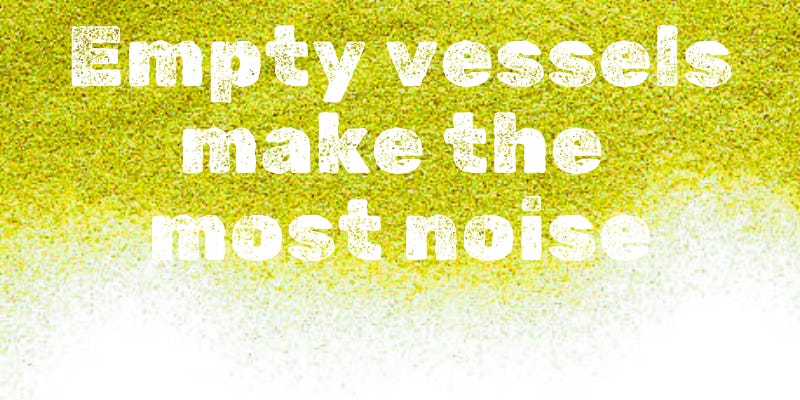What goes without saying (V): Empty vessels make the most noise
A series of conversations with phrases that might know more than we think
We assume that we know what common sayings and idioms mean. We've heard them a million times, so often that they've become background noise. They’ve been filed away either as simple truths or outdated wisdom.
But what if these phrases are more than meets the eye, and maybe they’ve been quietly pointing toward something deeper all along?
What if the sayings that feel most familiar, or most uncomfortable, are actually doorways into understanding the space between words, the quality of presence, the field that's always listening? Even the most ordinary phrases can carry the most extraordinary invitations.
There’s no right or wrong here, just some explorations into what else might also be true, in the layers we haven't noticed yet. Sometimes wisdom hides in plain sight, simply waiting for us to lean in and really listen.
~
“Empty vessels make the most noise”
A conversation…
Modern Reader: This one's obvious. It's about people who talk the most knowing the least. The louder someone is, the less substance they have. Classic.
The Phrase: (with a hollow ring) Classic assumptions. But what if you've got it backwards?
Modern Reader: Backwards? How can I have it backwards? Everyone knows what this means - people who are empty inside compensate by being loud.
The Phrase: You're thinking about emptiness as a flaw. But what if emptiness is exactly the space that lets sound resonate?
Modern Reader: I don't follow.
The Phrase: Tap a full water glass, then tap an empty one. Which one sings?
Modern Reader: The empty one... but that's different. We're talking about people.
The Phrase: Are we? Or are we talking about the relationship between fullness and resonance?
…
… (a pause)
…
When you bang on something that's packed solid, you get a dull thud.
When you touch something with space inside, you get music.
~
Modern Reader: So you're saying empty people make better... music?
The Phrase: I'm suggesting that maybe you've misunderstood what emptiness is. You think it means lacking something, but what if it means making space for something?
Modern Reader: That sounds like spiritual talk, we're talking about real people who ramble on without substance.
The Phrase: Real people, yes. Like the ones who fill every silence with nervous chatter because they can't stand the space. Or the ones who speak in endless paragraphs because they're afraid a pause might let someone else in.
But also real people like the ones whose words carry farther because there's space between them. Whose voices resonate because they're not stuffed full of their own agenda.
Modern Reader: Wait, are you defending the loud people or the quiet ones?
The Phrase: I'm not defending anyone. I'm questioning what you think noise is.
Modern Reader: Noise is... loud, unnecessary sound. Talking too much. Being obnoxious.
The Phrase: And what if some of that "noise" is just emptiness trying to be filled? What if some of those words are the sound of someone echoing around inside their own loneliness?
Modern Reader: That's... sad.
The Phrase: It is, and it's also beautiful.
Because - emptiness isn't the opposite of fullness, it's the condition that makes fullness possible.
Modern Reader: I'm confused.
The Phrase: A bell is empty inside, and that's not a design flaw - it's what makes it a bell. The hollow space is what lets it sing when touched.
Some people are like that.
…
Open.
Spacious.
And when life touches them, they resonate.
~
Modern Reader: But what about people who just talk endlessly without saying anything meaningful?
The Phrase: What about them? Maybe they're still learning that emptiness isn't something to fill as quickly as possible. Maybe they haven't discovered that the space inside them is already full of something that doesn't need words.
Modern Reader: So the "loudest noise" isn't always a bad thing?
The Phrase: Depends what you mean by noise. If you mean sound without purpose, then yes - that's probably someone running from their own emptiness instead of learning to live in it.
But if you mean the capacity to resonate, to amplify, to let something move through you and become bigger than it was...
Well, that takes emptiness too.
Modern Reader: (thoughtfully) I think I've been afraid of being empty.
The Phrase: Most people are, they’ve been taught that empty means worthless.
But look at the things that make the most beautiful sounds - drums, flutes, concert halls, even your own throat.
They're all hollow - that's not their limitation. That's their gift.
~
Modern Reader: What if I'm too full of my own stuff to resonate?
The Phrase: Then maybe it's time to make some space. Not by getting rid of what matters, but by loosening your grip on what doesn't.
Modern Reader: How do I know the difference?
The Phrase: Listen - not to what you think you should say, but to what wants to be said through you.
Empty vessels don't make noise on their own, they make music when something touches them.
What went without saying here might shift everything about how we think about fullness and emptiness…
That maybe the people we dismiss as "empty" are actually the ones allowing space for something to move through them.
That the capacity to resonate, to amplify, to let something bigger than yourself be heard - that takes a kind of hollowness we've been taught to fear.
We fill ourselves with so much - opinions, strategies, clever responses - that there's no room left for anything unexpected to emerge.
No space for the kind of listening that lets something new emerge.
Maybe the choice isn't between being full or empty - maybe it's between being stuffed or spacious.
What if the most profound voices belong to those who've learned to be hollow enough for something larger to sing through them?




🙏
I'm loving these reframes ❤️